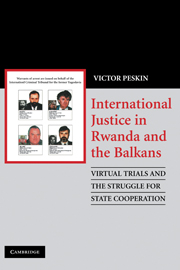 International Justice in Rwanda and the Balkans
International Justice in Rwanda and the Balkans Book contents
- Frontmatter
- Contents
- Maps and Timelines
- Acknowledgments
- Permissions
- Note on Pronunciation
- MAP 1 Map of the Former Yugoslavia
- MAP 2 Map of Rwanda
- PART I INTRODUCTION
- PART II THE BALKANS: STRATEGIES OF NON-COMPLIANCE AND INSTRUMENTS OF PRESSURE
- PART III RWANDA: VIRTUAL TRIALS, INTERNATIONAL JUSTICE, AND THE POLITICS OF SHAME
- 6 The Struggle to Create the International Criminal Tribunal for Rwanda
- 7 “Trials of Cooperation” and the Battles for Karamira and Barayagwiza
- 8 Investigating Rwandan Patriotic Front Atrocities and the Politics of Bearing Witness
- 9 Victor's Justice Revisited: The Prosecutor v. Kagame
- PART IV CONCLUSION
- Bibliography
- Index
7 - “Trials of Cooperation” and the Battles for Karamira and Barayagwiza
Published online by Cambridge University Press: 05 September 2012
- Frontmatter
- Contents
- Maps and Timelines
- Acknowledgments
- Permissions
- Note on Pronunciation
- MAP 1 Map of the Former Yugoslavia
- MAP 2 Map of Rwanda
- PART I INTRODUCTION
- PART II THE BALKANS: STRATEGIES OF NON-COMPLIANCE AND INSTRUMENTS OF PRESSURE
- PART III RWANDA: VIRTUAL TRIALS, INTERNATIONAL JUSTICE, AND THE POLITICS OF SHAME
- 6 The Struggle to Create the International Criminal Tribunal for Rwanda
- 7 “Trials of Cooperation” and the Battles for Karamira and Barayagwiza
- 8 Investigating Rwandan Patriotic Front Atrocities and the Politics of Bearing Witness
- 9 Victor's Justice Revisited: The Prosecutor v. Kagame
- PART IV CONCLUSION
- Bibliography
- Index
Summary
Introduction
A “trial of cooperation” refers to the battles fought between a tribunal and a targeted state over the terms and timing of that state's cooperation with tribunal investigations and prosecutions. This chapter centers on the narratives of two defining “trials of cooperation” that occurred between the International Criminal Tribunal for Rwanda (ICTR) and the Rwandan government, from the tribunal's turbulent beginning in late 1994 through early 2000. These virtual trials played a crucial role in shaping the tribunal–government relationship for years to come and helped set the stage for the Tutsi-led Rwandan government's subsequent success in blocking tribunal indictments of its own military officers suspected of massacring Hutu civilians during 1994. The outcome of these early trials of cooperation created a tribunal dynamic of acquiescence vis-à-vis the Rwandan government. This, in turn, emboldened the government to strategically withhold cooperation in order to control the court at key junctures and to shame the tribunal for its missteps and shortcomings.
This chapter begins with a brief discussion of the tribunal's initial efforts to establish a diplomatic relationship with the Rwandan government following the Security Council's November 1994 resolution authorizing the creation of the court. We then examine the two major trials of cooperation. The first “trial” occurred in 1996 and centered on Froduald Karamira, a notorious genocide suspect wanted by both tribunal prosecutors and the Rwandan government.
- Type
- Chapter
- Information
- International Justice in Rwanda and the BalkansVirtual Trials and the Struggle for State Cooperation, pp. 170 - 185Publisher: Cambridge University PressPrint publication year: 2008
